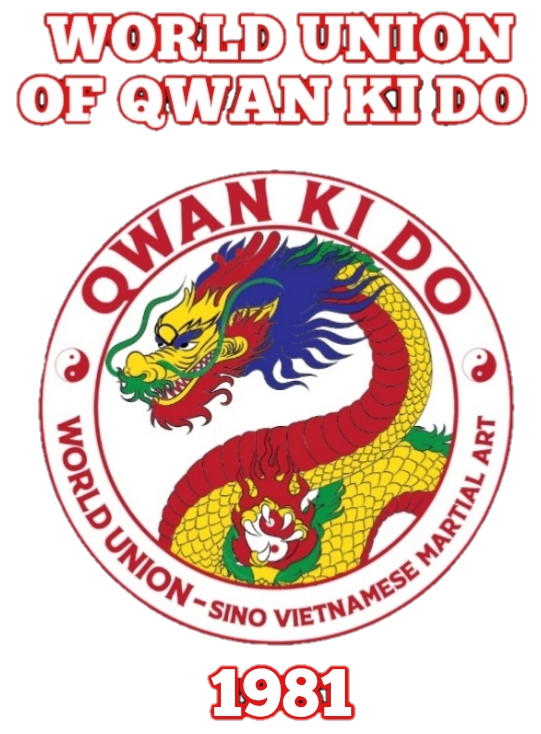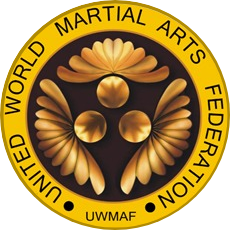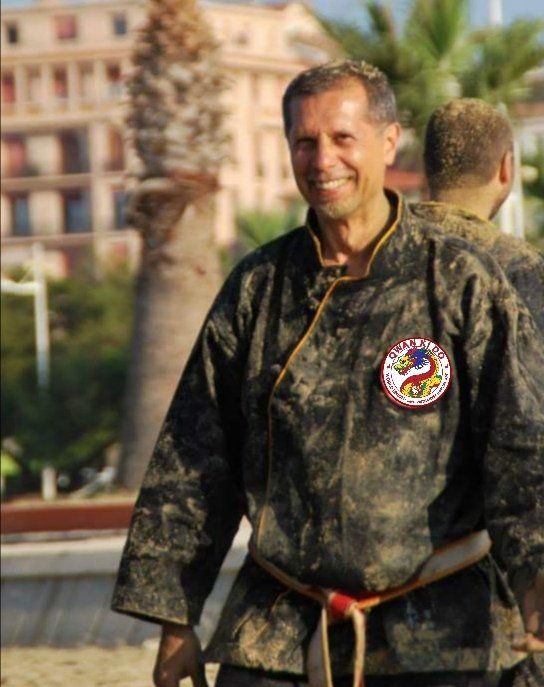Technical Director W.U.Q.K.D.-S.W.M.A.
Truyền Sư M° Roberto Vismara
A fervent sportsman in the 1970s, an ISEF student in Milan, passionate about ancient Rome and medieval history, young Roberto Vismara is interested in all types of sports (gymnastics, athletics, field hockey, basketball, volleyball) but has always been attracted to the martial arts, having great admiration for Asian culture. A large part of his research is oriented towards China, Korea, Vietnam and Tibet. In 1970 he starts practicing martial arts, first Judo with the Japanese Master Tadashi Koike (8th dan) and then Tae Kwon Do with the Vietnamese Master Tran Ngoc Dinh (2nd dan).
The desire to get closer to the source of his research prompts him to frequent Vietnamese students in Milan, and in 1975 he begins the practice of Vietnamese martial arts, founding with Master Tran Ngoc Dinh – the first Italian manager of the Quan Ky school of Viet Vo Dao – the association “Viet Vo Dao Quan Ky Lombardia.”
In 1976, he meets the young, internationally renowned Vietnamese Maître Pham Xuan Tong and is immediately attracted by this exceptional character, becoming his pupil. When he hears about a large convention of Vietnamese martial arts styles in Limoges, France, he does not hesitate and ventures there: the year is 1978.
It is on this journey that he discovers the Way.
Fate ordains the he be inextricably tied to Maître Pham Xuan Tong, who already is International Technical Director of the entire Vietnamese movement in Europe and in the World, and who during the Limoges convention sets up, organizes and directs the event together with his brothers.
As the only Italian accepted to the meetings of the Vietnamese Masters, due to his great organizational skills and for the trust that everyone shows him, Roberto Vismara becomes a prominent element of their organizational framework, especially within the Quan Ky school of Maître Pham Xuan Tong.
After hard trials faced with unmatched perseverance over the course of several years, Roberto Vismara finally reaps his reward: he is accepted into the inner circle of the Maître’s closest students, and within a short time becomes his first disciple, earning the rank of 1st Dang in 1979.
In 1981 Maître Pham Xuan Tong creates the Qwan Ki Do method.
Roberto Vismara offers to organize the technical dissemination of the new martial art on all of the Italian territory: thus the Italian Qwan Ki Do Union is born.
The organization expands thanks to his commitment and his organizational vision, with the valuable support of friends and students that he himself trained with equal determination, and together they achieved a level of success heretofore unimaginable for an organization led by an Italian.
In the same year, 1981, he founds, together with Maître Pham Xuan Tong, the World Union of Qwan Ki Do in Milan, Italy. It was a demanding and difficult task, a new test he had to pass without failing. It is with enthusiasm that he fulfills this demanding task, dedicating himself to it completely. His success is rewarded with the considerable expansion of Qwan Ki Do throughout the world in the 1980s.
In 1991, commissioned by the World Union of Qwan Ki Do, he ventures to Vietnam with a group of students to get to know his Master’s country of origin and experience first-hand the reality of the Vietnamese Martial Art. There he meets a fellow disciple of Maître Pham Xuan Tong, Master Pham Minh Kinh, and establishes important contacts with other experts in preparation for his Master’s trip to Vietnam.
In 1993 he founds the Phuong Long Italy Cultural Association, which assembles his most loyal students. The Association aims to develop practitioners and instructors of high technical, pedagogical and moral standard who are altruistically dedicated to the development and dissemination of the Art.
The organization, directly tied to Maître Pham Xuan Tong’s International Quan Ky Center in Toulon, France, becomes the nerve center of research and development for the technique and training of the Italian Qwan Ki Do Union instructors, coordinating all their technical and pedagogical activities. Among the students coming out of this school, thanks to the professionalism and the human and technical preparation they underwent, are the future leaders of the Italian Qwan Ki Do Union.
In 1994, Maestro Roberto Vismara organizes the first Qwan Ki Do World Championship at the Palalido in Milan, a great success in terms of both attendance and image thanks to the impeccable organization and the spectacular demonstrations of Maître Pham Xuan Tong and the Italian Demonstration Team.
In 1998, before the second Qwan Ki Do World championship in Ivory Coast, he successfully passes the exam for Black Belt 6th Dang and is thus among the most highly graded of the method in the world.
In April 2005, in Bucharest, Romania, alongside Maître Pham Xuan Tong and his lifelong friend G. S. Bertoletti, the President of the Romanian Olympic Committee awards him the distinction of “Excellence” as a reward for more than 30 years of service to the martial arts.
In 2007, at the end of the fourth World Championship in Bucharest, he is honored with the grade of 7th Dang. In 2008, during an event organized by the online magazine “ilguerriero.it” for awarding the Martial Arts Oscars, he receives the Career Award and the designation of “Master of the Year” for the practice and dissemination of Qwan Ki Do.
In 2009 Maître Pham Xuan Tong and the Council of Elders officially appoint Maestro Roberto Vismara the official representative of Maître Pham Xuan Tong, and in a public ceremony combined with the delivery of the belt, the Founder Office bestows upon him the title of Sư Trưởng, “guarantor of the Qwan Ki Do method.”
In 2010 he is one of the founders of the Association “La Compagnia del Drago e della Fenice” (“the Society of the Dragon and the Phoenix”), with which he aims to present a faithful recreation of civil and military life of medieval Chinese and Vietnamese history. Thus, in 2011, at the fortress of Soncino, he organizes a grand historical reenactment with more than 1500 practitioners in medieval Chinese-Vietnamese costumes.
It is during that time, while he is reaping the great fruits of his extraordinary collaboration with Maître Pham Xuan Tong, that a need to reform some important organizational aspects of International Qwan Ki Do and the organization’s decision-making processes starts to emerge, requiring increasing participation and collective sharing of the agreed-upon goals. Without hesitation, Maestro Roberto Vismara becomes the spokesman for these motions for change with Maître Pham Xuan Tong and the rest of the leadership.
In 2014 Maestro Roberto Vismara participates in the transformation of the World Union of Qwan Ki Do into a recognized Federation under the name of INTERNATIONAL QWAN KI DO FEDERATION (IQKDF) and Associated Disciplines, which is officially registered in Switzerland in January 2015. On that occasion Maître Pham Xuan Tong appoints him Head of the International Technical Council, the supreme technical body within the new Federation.
Another success of Maestro Roberto Vismara’s tireless work is the entry of IQKDF in TAFISA.
In June 2016 he obtains the grade of 8th Dang.
It is during this time that, thanks to his commitment, the Academy that is part of the Phuong Long Italy Cultural Association is recognized at the European level. Maestro Roberto Vismara’s teaching method, popularized through the Italian Qwan Ki Do Union, obtains the quality certification and the Academy is certified as a European Academy – Educational Training Center. In 2019 Maestro Roberto Vismara obtains the qualification of Head Master with the title of “Hon. International Coach – 8th level of EQF” (European Qualification Framework).
The years 2015 and 2016 unfortunately see the emergence of marked divisions within the leadership of Qwan Ki Do International, resulting from the failure to recognize the motions for reform that started as early as 2010.
The reforming group, led by Maestro Roberto Vismara, renews its attempts at change in order to address a number of issues that have become priorities for the survival of the martial art: the increasing bureaucratic centralization of decision-making powers in the hands of a small group of people, the persistent repression and suffocation of internal dialogue, the total centralization of martial arts knowledge and related management responsibilities in the hands of a very few, the progressive lack of a vision of genuine dissemination and growth, the insufficient investment of the financial resources from dues and events in training and in supporting the growth of national associations.
Such attempts at reform are always, however, conducted with respect for the discipline and with the utmost discretion, remaining true to the principles of school unity and respect for internal hierarchy.
Between 2017 and 2020, in response to growing calls for change, the IQKDF leadership retaliates through the gradual marginalization of dissenters making reformist demands and their removal from senior positions.
Thus, in the spring of 2020 a group of international leaders under the leadership of Maestro Roberto Vismara, having realized the futility of their calls for reform, decides to abandon their hopes of change from within and takes the painful and dramatic decision to separate from the IQKDF and its leadership and re-found the WORLD UNION OF QWAN KI DO AND SINO-VIETNAMESE MARTIAL ARTS.
It is on the premise of fidelity to the vision of the martial art as a complete path for human development and all of humankind that Maestro Roberto Vismara has founded his tireless practice and his loyal and strong collaboration with Maître Pham Xuan Tong during 45 years.
And it is out of fidelity to that vision that Maestro Roberto Vismara in 2020 became the force behind the re-foundation of the World Union of Qwan Ki Do and Sino-Vietnamese Martial Arts.
His closest collaborators, recognizing his human, organizational and technical qualities, portray Maestro Roberto Vismara with a phrase from Buddha:
“Reflective among the unreflective,
awake among those who sleep,
the wise man proceeds like a racehorse,
leaving the others behind as if they were worn out.”





